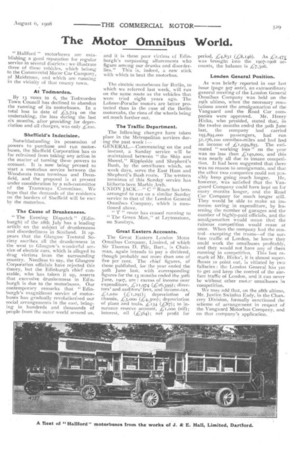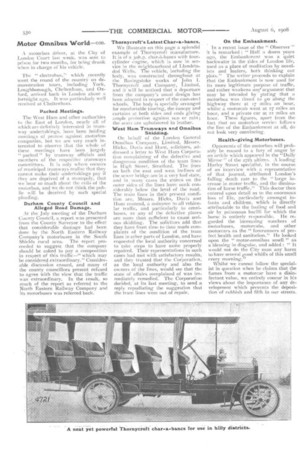The Motor Omnibus World.
Page 7

Page 8

If you've noticed an error in this article please click here to report it so we can fix it.
" HaIlford " motorbuses are establishing a good reputation for regular service in several districts : we illustrate three of these vehicles, which belong to the Commercial Motor Car Company, of Maidstone, and which are running in the vicinity of that county town.
At Todmorden.
By 13 votes to 6, the Todrnorden Town Council has declined to abandon the running of its motorbuses. In a total loss to date of 4'3,724 on the undertaking, the loss during the last six months, after providing for depreciation and all charges, was only £200.
Sheffield's Indecision.
Notwithstanding its possession of powers to purchase and run motorbuses, the Sheffield Corporation has so far refrained from taking any action in the matter of turning these powers to account. It is now being pressed to start a motorbus service between the Wocxlseats tram terminus and Dronfield, and the proposal is at present under consideration by a sub-committee of the Tramways Committee. We hope that the demands of the residents on the borders of Sheffield will be met by the motorbus.
The Cause of Drunkenness.
"The Evening Dispatch " (Edinburgh) of the 28th July has a leading article on the subject of drunkenness and disorderliness in Scotland. It appears that the Glasgow Teetotal Society ascribes all the drunkenness in the west to Glasgow's wonderful service of electric cars, which is alleged to drag victims from the surrounding country. Needless to say, the Glasgow Corporation officials have rejected this theory, but the Edinburgh chief constable, who has taken it up, asserts that excessive drunkenness in Edinburgh is due to the motorbuses. Our contemporary remarks that " Edinburgh's magnificent service of motorbuses has gradually revolutionised our social arrangements in the east, bringing in hundreds and thousands of people from the outer world around us, and it is these poor victims of Edinburgh's surpassing allurements who figure among our drunks and disorderlies." This is, indeed, a new stick with which to beat the motorbus.
The electric motorbuses for Berlin, to which we referred last week, will run on the same route as the vehicles that were tried eight years ago. The Lohner-Porsche motors are better protected than in the case of the Berlin motorcabs, the rims of the wheels being set much further out.
The Traffic Department.
The following changes have taken place in the Metropolitan services during the past week :-- GENERAL—Commencing on the 2nd instant, a Sunday service will be maintained between " the Ship and Shovel," Rippleside and Shepherd's Bush, by the omnibuses which, on week days, serve the East Ham and Shepherd's Bush route. The western terminus of this Sunday service has hitherto been Marble Arch.
UNION JACK.—" C "Route has been arranged to run on a similar Sunday service to that of the London General Omnibus Company, which is mentioned above.
" T " route has ceased running to " The Green Man," at Leytonstone, on Sundays.
Great Eastern Accounts.
The Great Eastern London Motor Omnibus Company, Limited, of which Sir Thomas D. Pile,. Bart., is Chairman, again intends to pay a dividend, though probably not more than one of five per cent. The chief figures, of those published, for the year ended the 3oth June last, with corresponding figures for the is months ended the 3oth June, 1907, are : excess of income over expenditure, ,4;i1,97.1. (Z*16,399); directors' and auditors' fees, and income-tax,
(.4:1,291); depreciation of chassis, 4.-5,000 (L4,500); depreciation of plant and tools, 4-134 (4;87); to insurance reserve account, £m,000 (nil); interest, nil (L364); net profit for period, 44,831 (.68,46). As ,4;2,47.;,
was brought into the 1907-1908 accounts, the balance is ,4;7,3o6.
London General Position.
As was briefly reported in our last issue (page 507 ante), an extraordinary general meeting of the London General Omnibus Company was held on the 29th ultimo, when the necessary resolutions anent the amalgamation of the Vanguard and the Road Car companies were approved. Mr. Henry Hicks, who presided, stated that, in the twelve months ended the 3oth June last, the company had carried 195,894,000 passengers, had run 32,176,100 omnibus-miles and had had an income of .4'1,059,893. The estimated " working loss " on the year was no less than ,4.140,000, and this was nearly all due to insane competition. It had been suggested that there was no reason to amalgamate, and that the other two companies could not possibly keep going much longer. He, however, was satisfied that the Vanguard Company could have kept on for many months longer, and the Road Car Company for much longer still. They would be able to make an immense saving in expenditure, by lessening the number of garages and the number of highly-paid officials, and the amalgamation would mean that the ruinous competition would cease at once. When the company had the control--excepting the trams—of the surface traffic. of London, he knew they could work the omnibuses profitably, and they would not have any of them running in competition. This last remark of Mr. Hicks', it is almost superfluous to point out, is vitiated by two fallacies : the London General has yet to get and keep the control of the surface traffic of London, and it can never be without other motor omnibuses in competition.
We may add that, on the 28th ultimo, Mr. Justice Swinfen Eacly, in the Chancery Division, formally sanctioned the scheme of arrangement in respect of the Vanguard Motorbus Company, and on that company's application. A motorbus driver, at the City of London Court last week, was sent to prison for two months, for being drunk when in charge of his vehicle.
The " electrobus," which recently went the round of the countrY. on demonstration tours, including York, Loughborough, Cheltenham, and Oxford, arrived back in London about a fortnight ago. It was particularly well received at Cheltenham.
Packed Meetings.
• The West Ham and other authorities to the East of London, nearly all of which are definitely interested in tramway undertakings, have been holding meetings of protest against motorbus companies, but we are very much interested to observe that the whole of these meetings have been largely " packed " by tramway officials and members of the respective tramways committees. It is only where owners of municipal tramways realise that they cannot make their undertakings pay if they are deprived of a monopoly, that we hear so much about the evils of the motorbus, and we do not think the public will be deceived by such special pleading.
Durham County Council and Alleged Road Damage.
At the July meeting of the Durham County Council, a report was presented from the County Surveyor to the effect that considerable damage had been done by the North Eastern Railway Company's motorbuses in the South Shields rural area. The report proceeded to suggest that the company should be asked to pay a composition in respect of this traffic—" which may be considered extraordinary." Considerable discussion ensued, and many of the county councillors present refused to agree with the view that the traffic was extraordinary. In the result, so much of the report as referred to the North Eastern Railway Company and its motorbuses was referred back. Thornycroft's Latest Char-a-bancs.
We illustrate on this page a splendid example of Thornycroft manufacture. It is of a 3oh.p. char-a-bancs with fourcylinder engine, which is now in service in the neighbourhood of Llandrindod Wells. The vehicle, including the body, was constructed throughout at the Basingstoke works of John I. Thornycroft and Company, Limited, and it will be noticed that a departure from the company's usual design has been adopted in respect of the cast-steel wheels. The body is specially arranged for comfortable touring, the canopy and curtains at both sides and ends giving ample protection against sun or rain ; the seats are upholstered in leather.
West Ham Tramways and Omnibus Skidding.
On behalf of the London General Omnibus Company, Limited, Messrs. Hicks, Davis and Hunt, solicitors, addressed a letter to West Ham Corporation complaining of the defective and dangerous condition of the tram lines in High Street, Stratford. The lines on both the east and west inclines of the sewer bridge are in a very had state, and in many cases the stones on the outer sides of the lines have sunk considerably below the level of the road. The tram lines in their present condition are, Messrs. Hicks, Davis and Hunt contend, a nuisance to all vehicular traffic, and particularly to omnibuses, as any of the defective places are more than sufficient to cause serious skidding. The solicitors add that they have from time to time made cornplaints of the condition of the tram lines in other parts of London, and have requested the local authority concerned to take steps to have same properly repaired. Their representations in such cases had met with satisfactory results, and they trusted that the Corporation, as the local authority and also the owners of the lines, would see that the state of affairs complained of was immediately remedied. The Corporation decided, at its last meeting, to send a reply repudiating the suggestion that the tram lines were out of repair. On the embankment.
In a recent issue of the " Observer " it is remarked " Half a dozen years ago, the Embankment was a quiet backwater in the tides of London life, used as a place of meditation by novelists and loafers, both thinking out plots." The writer proceeds to explain that the Embankment is now used for its more legitimate purpose of traffic, and rather weakens art3 argument that may be intended by ,;tating that a motorbus was tinted to go along the highway there at 17 miles an hour, whilst a rnotorcab went at 27 miles an hour, and a private car at 22 miles an hour. These figures, apart from the fact that no motorbus service follows the line of the Embankment at all, do not look very convincing.
Health-giving Motorbuses.
Opponents of the motorbus will probably he roused to a fury of anger by an article which appeared in the "Daily Mirror " of the 27th ultimo. A leading Harley Street specialist, in the course of an interview with a representative of that journal, attributed London's falling death rate to the "large increase in motor traffic, and the diminution of horse traffic." This doctor then entered upon detail as to the enormous loss of life, particularly amongst infants and children, which is directly attributable to the fouling of food and air by poisonous bacilli for which the horse is entirely responsible. He regarded the increasing numbers of motorbuses, motorcahs, and other motorcars as the " forerunners of perfect health and sanitation." He looked upon the " motor-omnibus smell " as a blessing in disguise, and added : " It would not do the City' man any harm to have several good whiffs of this smelt every morning."
Whilst we cannot follow the specialist in question when he claims that the fumes from a motorcar have a disinfectant value, we entirely concur in his views about the importance of any development which prevents the deposition of rubbish and filth in our streets.


















